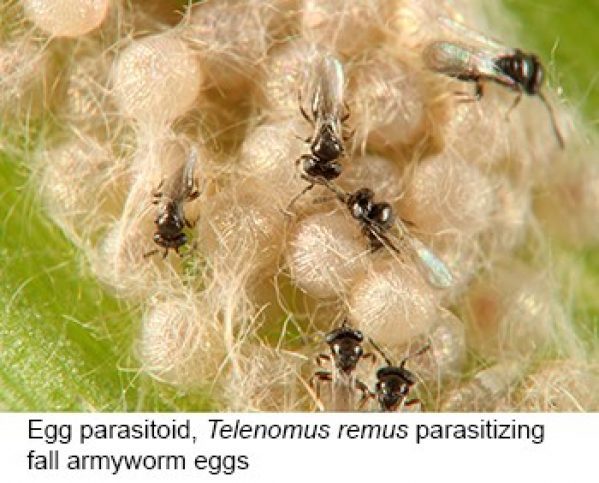Management of the invasive fall armyworm (FAW), scientifically known as Spodoptera frugiperda in Africa, requires the deployment of all tactics within the context of integrated pest management (IPM). The International Centre of Insect Physiology and Ecology (icipe) has launched mass releases of indigenous natural enemies of FAW in Kenya.
In Africa, the cultivation of maize represents one of the most important sources of food security, income generation and employment for over 300 million people. However, the recent invasion by FAW has led to yield losses of 8 – 20 million tonnes of maize on the continent.
Maize is attacked by diverse species of native and invasive stemborer pests in Africa. However, the FAW has become the most devastating. It attacks all the developmental stages of the maize plant attracting an unprecedented scale of broad-spectrum application of chemical insecticides by the growers. In Ethiopia and Kenya, more than 50% of maize growers that applied chemical pesticides for FAW control reported that they only provide marginal control or they are completely ineffective. These chemical pesticides are not only ineffective but expensive and pose serious detrimental effects to humans, biodiversity and the environment.
Since the first detection of FAW in East Africa, icipe, jointly with national and international partners have embarked on basic and applied research to understand the ecology of the pest in Africa to guide the development of sustainable management strategies suited for African conditions. Technologies such as the use of icipe’s Push-pull technology, maize-legume intercropping and biopesticides have proven to be a key part of sustainable management strategy for FAW, particularly under smallholder maize production systems in Africa. These technologies are eco-friendly and compatible with the use of biological control agents.
“Though FAW is an alien invasive pest, our research has unravelled significant information on widely distributed native parasitoid species in Africa (namely Telenomus remus, Trichogramma chilonis and Cotesia icipe) and their ability to successfully parasitize and kill the invasive pest” explained, Dr Samira Mohamed, Senior Scientist, icipe

Our approach focusses on evaluating the performance of these native parasitoids on various life stages of the FAW to identify the most effective one. Further we intend to mass produce these effective parasitoids and release them in the FAW hotspots along with other eco-friendly management technologies to effectively manage the pest and improve maize yield”, added Dr Mohamed.
In the last quarter of 2020 and following a comprehensive assessment of the performance of the native parasitoids, icipe jointly with national partners in Kenya has embarked on their mass releases. So far over 140,000 wasps each of Telenomus remus and Trichogramma chilonis that parasitize FAW eggs; and 5,000 wasps of Cotesia icipe that parasitize early larval stages of FAW have been released in five counties (Taita-Taveta, Machakos, Embu, Meru, and Nyeri) of Kenya with very encouraging results.

The initial post release field assessments revealed that parasitism rates of FAW in the field increased by 55%, 50% and 38%, for Trichogramma chilonis, Telenomus remus and Cotesia icipe, respectively. “The released parasitoids work synergistically to bring down the population of FAW by attacking different developmental stages (eggs and larvae) of the pest. However, for these parasitoids to be able to effectively contribute to the suppression of pest, they need to be conserved by minimizing application of broad-spectrum chemical insecticides”, added Dr Mohamed.
“There are further plans for mass releases of these beneficial insects in other major maize growing zones across Kenya. Also, plans are under way with the national partners to expand the releases of these natural enemies to other eastern and southern African countries”, concluded Dr Sevgan Subramanian, Principal Scientist, icipe.









